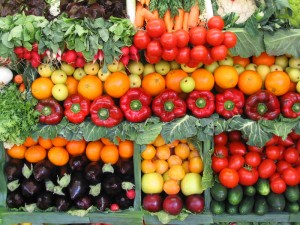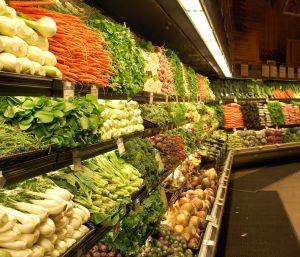In the good old days, my mother and grandmother used to buy almost all their produce from markets. I have vivid memories of the market in Coventry when I was very young. The noise, colour and excitement, not to mention the soft ice cream I usually got there! My parents always loved markets, and would typically spend Saturdays perusing one town centre or another to go around the fantastic old markets of the North West.
These days the options are greater than ever: farm shops, regular markets, farmer’s markets, people flogging veg from their allotments, you name it. The quality and freshness are usually at least as good, often far better than the supermarkets by virtue of being faster to market and sourced locally. And yes, typically prices are significantly lower.
So unless we are sourcing particularly obscure products (for which you should go to Chinese or Indian supermarkets anyway – they offer an incredible range of amazing ingredients), why do we bother with supermarkets? The reasons quoted by some friends make interesting reading:
- It’s all packaged conveniently
- It’s washed
- You can order online and get it delivered.

I’ve always viewed packaging as a major disadvantage: apart from the ecological impact of over-packaging on landfill, you can’t touch and smell the produce. Go to the continent and you’ll find women in particular will really get down and dirty – nothing will be purchased til they are sure it’s the best, and neither will that mean just the “beautiful” veg that corresponds in size and shape to a supermarket’s view of what a shopper expects it to look like – for continental shoppers, flavour is what matters. No supermarket rubber strawberries or tomatoes tasting of precisely nothing – the more robust the flavour, the better!
This of course is also the main argument against delivery services – whatever guarantees the supermarket offers, you can’t see, smell, touch and select your produce to make sure you’re getting the best. In fact, local shops may well deliver as an extra service but also allow you to choose your own produce. Best of both worlds, but it does pay to get out and see that you choose the best.
And for that matter, what can be better than buying veg so fresh they still have mud clinging to them? Yes, they have to be washed, but the same is true of supermarket veg that will be coated in pesticides. And what’s worse are the supermarket specifications to their suppliers that their products must be washed and shiny!! I heard this said of potatoes, though in some cases they have the gall to wash them before coating the spuds in light loam to make them look like they just came from the earth. Sleazy or what?
Just one note to add to that: organic does not automatically mean higher quality or better tasting, though it could well mean better for you. As with all food products, the more you shop around the better you will find, and chances are that a good number of the best products you find will be organic.
The implication of supermarket policies is that the British consumer wants as little direct contact with fresh raw ingredients as possible. In fact, they would much prefer us to buy their ranges of processed dinners which give them bigger mark-ups and restrict the cooking process to 5 minutes in the microwave. A very sad indictment of our attitude to food, all the more so given the endless popularity of TV programmes telling us how to source and cook great local ingredients. I hope it inspires more British householders to get out there and DO some real live cooking, rather than slobbering over food porn on the goggle box. The cooking can be great fun in its own right, but maybe some people have not been educated in how to do it and simply don’t have the confidence or desire any more. If you at least try you can learn what the various veg do and discover how rewarding the flavours can be!
In Tiptree there are two supermarkets, a Tesco and an Asda. But a little further up the road towards Kelvedon there is a farm shop that sells a wide range of excellent local produce, in season. This includes stuff from local cottage industries that does not make its way on to supermarket shelves, but is invariably excellent. The stuff sold is wonderful – fresh Essex asparagus as it is grown, for example. No regional distribution centres or packaging plants, just fresh and put in a brown paper bag. What more do you need? Just look around you for what is fresh and readily available, then cook it simply. Bliss!!

